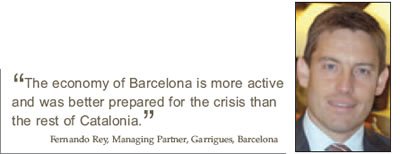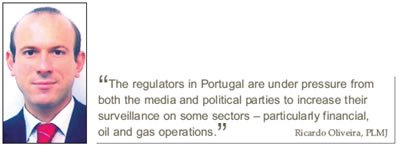Barcelona Report 2009: Redefining the brand
In order to counter the decline of Barcelona’s traditional heavy industry and manufacturing base, Iberian Lawyer’s Annual Report finds the city reinventing itself as an international research and development and technology centre to rival any in Europe.
Nowhere in Spain is immune to the economic downturn, but what is significant, say lawyers, is the way regions and local economies are reacting to the crisis. The emphasis, they say, must now be on moving forward. The economic crisis is a reality and banks, businesses, government and regional authorities must look for new areas of growth and where necessary to build new economies. Nowhere is this process more evident than in Barcelona.
Barcelona is continuing to place emphasis on its traditional economic base while at the same time looking to “kickstart” a new economy – where the emphasis is on emerging technology and value-added and service industries – while also highlighting the obvious lifestyle benefits of its Mediterranean location that continue to attract international interest and investment.
“The economy of Barcelona is more active and was better prepared for the crisis than the rest of Catalonia. Barcelona has highly developed service and tourism sectors, while emerging new technology and audiovisual industries – focused on a new area of the city, the 22@ quarter – are gaining in importance for the local economy,” says Fernando Rey, head of the Barcelona office of Garrigues.
New challenges old problems
Even before the onset of the current economic and financial crisis, Barcelona was already facing considerable challenges, say lawyers, with rising unemployment and decreasing local productivity within its core industrial base. The need to restore Barcelona’s economy existed even before the current crisis. However, in my view positive factors are clearly present, including the region’s highly diversified economy, which infers an ability to cope more easily,” says Agustín Bou, corporate and insolvency partner at Jausas.
The process of globalisation had brought increased international competition against Catalonia’s textile, manufacturing and automotive industries, in response to which many companies had “delocalised” – relocating plants abroad to capitalise on lower production and labour costs. The global reduction in international trade and consumer spending has therefore now added an international dimension to an already evident local problem.
“We are in a deep financial crisis that is greatly affecting certain key industries that are of great importance in the Barcelona area, says Ariadna Cambronero, Managing Partner of the Barcelona office of Uría Menéndez.
The collapse in construction and real estate activity, along with a drop in demand among car manufacturers – Catalonia remains the focus for much of Spain’s automobile industry as well as its supplier base – have been felt strongly. The combined result, say lawyers, is that many local clients are now demanding more acute legal advice.
“The situation in Catalonia is the same as the rest of the world – industry is suffering to a large extent from the credit crunch and a fall in consumption. We are seeing more collective dismissals, restructurings, and financial restructurings,” says Tomás Dagá, Managing Partner of the Barcelona office of Osborne Clarke.
Local companies are grappling with an array of problems but budgetary pressures are also inevitably meaning many are being more selective about when and how they use outside law firms, note others.
“The general economic environment in addition to the credit crunch is focusing clients towards only that advice which refers to cost controls, savings to their economic situation, or compliance services addressed to avoid penalties from the authorities,” says Juan Ramón Ramos, Managing Partner of Landwell.
In line with the wider economy, local firms have therefore inevitably also seen a drop off in transactional and private equity work, says Jaime Velázquez, co-managing partner of Clifford Chance in Barcelona. “The situation is very different from even a year ago, the high end deals are no longer there. But I believe that firms retain the flexibility to adapt to the new situation and we all recognise the need to get closer to our clients.”
Old problems new opportunities
Nonetheless, some believe that, largely as a result of the poor regional economy, many companies had – even before the onset of the current crises – already begun to reassess their future strategies and to look for new and emerging business opportunities.
“The current situation – even though it looks bad – is both interesting and challenging for Catalan companies, which to an extent are well equipped to embrace change and to take advantage of the distressed Spanish market,” says Antoni Valverde, partner at Freshfields Bruckhaus Deringer in Barcelona. “Catalan companies may yet do better than many across Spain, where there is still a fair amount of confusion, as if business leaders are still waiting for someone else to point which way to go.”
Despite the evident macroeconomic issues, businesses across the region are not all suffering equally, agree lawyers. Many manufacturers had already adopted innovative policies and diversified internationally in order to increase their competitiveness, while other business sectors are emerging at the front line of innovation – among them nanotechnology, life sciences and biotechnology, and internet-related companies.

“Within the context of the crisis we can see a number of companies that are really seizing their opportunities, and which the economic situation may even make even more efficient or innovative,” says Carlos Valls of specialist firm, Iuris Valls Abogados.
Others note an increased willingness now among the region’s established tier of midsize businesses to expand internationally. “”The economic crisis has meant that even medium-size companies feel compelled to seek new horizons in order to survive,” says Ricard Gené at Ventura Garcés & Lopez-Ibor. José Antonio Soler Ross, managing partner at Maniega & Soler, agrees. “It is within a time of crisis that most have to contemplate strategic or geographic changes.”
A new direction
Innovation is a recurring theme among lawyers discussing the economic prospects of Barcelona. In order to change the emphasis of the city, the local authorities have already embarked on a series of redevelopment projects intended to attract new investment, with a clear focus towards the design, media, information technology (IT) and life sciences industries. With a number of firms, such as Rousaud Costas Durán, placing increased emphasis on helping universities commercialise research technologies.
Among the initiatives already underway has been the redevelopment of the city’s Poblenou neighbourhood and the reemergence of the ”22@ district” as a hub for new technology and research and development businesses. The project has seen the redevelopment of 200 hectares of former industrial land into a modern business space which counts over 1,000 companies as well as university and research facilities, generating over 30,000 jobs.

Among the individual successes, has been the Microsoft Preincubation Centre, developed by Barcelona Activa (Barcelona City Council), Microsoft and Osborne Clarke, while the city’s leading business schools are also helping to attract and foster new entrepreneurial talent, say lawyers. ESADE has recently announced plans to build its new Creapolis Campus, combining a business school, science park and innovation centre in Sant Cugat del Vallès. Even the city’s annual Sonar music and multimedia festival is helping to reinforce the city’s 21st century image, suggest some.
“There is a cluster mentality, the technology companies attract more expertise and the business schools encourage a more entrepreneurial spirit. This combination is positioning Barcelona as Spain’s ‘start-up’ capital and an inevitable result is a dramatic upturn also in emerging company investment,” says Joan Roca Sagarra of Roca Junyent.
The relocation of Spain’s communications regulator (Comisión del Mercado de las Telecomunicaciones) has also helped to consolidate the city’s reputation as a media and technology centre, say others. “The current efforts are heading in the right direction and the results are clearly visible,” says Alejandro Angulo of IP boutique Grau & Angulo.
For others however, the city’s rebirth is still taking too long. “Matters are progressing very slowly. The efforts of the Barcelona City Council to attract investment in information technologies through the 22@ initiative, plus the emphasis towards biotechnology and medical investigation, might give results in the mid term,” says Juan Ramón Ramos, Managing Partner of Landwell.
Fernando Rey at Garrigues, agrees. “The city is modifying its focus away from traditional industry towards the new forms of economic activity. That’s the path for the future, a challenge the city needs to meet. But for the time being, it’s still only a tendency which we can’t consider fully consolidated.”
An important aspect of Barcelona’s future prosperity must also be continued investment in the city’s infrastructure, says Jordi Planchart Remmert, Director of the Barcelona office of Schiller Abogados. “The development of Barcelona’s communication and transport connections including the high speed train link to Madrid, and ultimately the French border, as well as the construction of a new airport will all help contribute to Barcelona’s position as a more competitive location in the international contest.”
Legal reaction
Inevitably such developments are prompting law firms to adapt and rethink their own business strategies as the region’s companies both absorb the impact of macroeconomic developments, and looks to move in new directions.
“Change, internationalisation, sophistication and client service are key. We are gearing up to take advantage of the inevitable changes in the business landscape,” says Valverde at Freshfields. Gerard Serra, partner at Pérez-Llorca agrees that the current situation is affecting law firms’ relationships with their clients.
“Many now request that we take into account their economic and financial position. It is the moment to support them in order to foster a stable and lasting commercial relationship – a crisis can always be considered an opportunity but will demand changes and sacrifices for law firms.”
Ramon Mullerat of KPMG highlights the recent appointment of Barcelona as the seat of the Secretariat for the Union of the Mediterranean, focused on encouraging economic growth and stability, and the resulting potential for the city to emerge as a regional centre for dispute resolution. Also the recent award of Barcelona as the European City of the Future by the Financial Times.
“A diversified local economy, strong tourist industry and less reliance on construction gives Barcelona a better chance of handling hard times than many other European regions,” he says.
A number of firms continue therefore to put growing emphasis on the region, such as Gómez-Acebo & Pombo, having recently absorbed high profile local tax and finance boutique Padrol Munté. “The key challenge is to adapt to the changing needs of the clients. We have to offer solutions, not only good advice,” says Iñigo Igartua, Barcelona Managing Partner.

Nonetheless, in the interim, the key management challenges facing the city’s law firms continue to be cost control, enhancing attorney productivity and monitoring the fees collection cycle, say lawyers. But among medium-size law firms many report that while the volume of work may not have changed substantially the practice emphasis clearly has. As elsewhere in Spain, firms report a dramatic increase in demand for corporate restructuring, refinance, insolvency and litigation expertise.
“We are facing huge growth in litigation. In the past there was a tendency to settle rather than litigate, which may nowadays be impossible due to the economic situation of one of the parties involved. Although clients are also now asking for fee arrangements versus the traditional hourly rate billing system,” says Jordi Planchart Remmert at Schiller Abogados.
Typically crises may bring uncertainty but Juan Amigó Müller of Leysters Abogados, is among those that also perceive it as a time of opportunity. His firm, he says, has a flexible structure and the ability to adapt to rapid environmental changes including changes in the types of work now being seen, and in order to invest in its long term is now looking to move into bigger premises.
A number of small and mid-size firms see the current crisis, and clients’ evident price sensitivities, as offering the potential to attract work from larger local firms, as well as to build a profile among the new businesses emerging from the city’s technologies centres.
“We are redefining our strategic policy, designing new products, applying a pricing policy for specific corporate sectors and legal services, improving segmentation and selection of clients and matters, increasing flexibility, and promoting paralegal assistance,” says Enrique Marinel-lo Jordan at Monereo Meyer Marinel-Lo in the city. Clients want more value for money, closer personal involvement from their lawyers and a more creative and commercial approach, say some.
“Personal involvement is easy to say, but difficult to implement. It will require, perhaps, increasing senior involvement, juniors intervening with more freedom to act and decide, an extra element of emotional risk assumption,” says Carlos Valls, whose firm is now looking to expand to Madrid.
Outlook
Barcelona’s lawyers are therefore pragmatic about the scale of the issues facing the region’s businesses, but remain optimistic also about the future direction of the city and its economy.
“The efforts being made to reposition Barcelona have achieved the goal of putting it on the map as a platform for innovative businesses and start-ups. Efforts should now be focused towards consolidating the city as a permanent location for these type of businesses,” says Thaïs Tarragó van Wijk of Legalia Abogados.
Such a turnaround will inevitably take time, but a number of lawyers point to the regions’ political situation, and the continuing calls by some politicians for greater autonomy from Catalonia, as a distraction away from the current economic challenges facing the region. “It is a delicate issue but fundamental to the success of the region, and of Spain, is to fix the economy,” says one local managing partner. The economic situation is nonetheless forcing law firm managers to look at new ways to increase their own efficiency while inevitably maintaining quality.
“The key is to adapt to the needs of our clients and their current situation in order to offer them imaginative solutions that can help them overcome the problems they are facing in the current financial situation. But internally, we must not lose sight of our long and medium term objectives,” says Cambronero at Uría Menéndez.

Barcelona’s economic revival will clearly require more than mere rhetoric, and public authority investment, but also a change of perception within the city itself, suggest some. The region’s industrial sectors may have already experienced economic pain but there may be more before things get better.
“Barcelona is a city accustomed to facing difficulties but because of that I am optimistic about the future, about the city’s ability to reinvent itself and for the continuing strength and evolution of the local economy,” says Emilio Coco, managing partner of Cuatrecasas in Barcelona.











